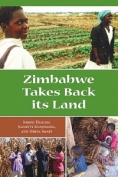Zimbabwe: The Leaden Times
My latest article on recent developments in Zimbabwe appeared today in Jungle World (html here, you can also download the page with the text as pdf). The opposition to Zanu PF rule is in deep trouble notwithstanding the latest demonstrations against President Robert Mugabe in mid-April. Scholars Brian Raftopoulos and Julia Gallagher answered my questions concerning the situation in Zimbabwe.
Zimbabwe: Zanu PF Triumphs in Elections, MDC Alleges Fraud
 For German media, the situation in Zimbabwe seems perfectly clear: President Robert Mugabe is an “old devil” (Spiegel Online) or a “devilish long-time president” (Stutt-garter Zeitung) who, it is said, ruined the country during his 33 years in power. The development of the country, however, is much more complex than the media suggest. Read my article on Zimbabwe in the latest issue of Jungle World (German, pdf here).
For German media, the situation in Zimbabwe seems perfectly clear: President Robert Mugabe is an “old devil” (Spiegel Online) or a “devilish long-time president” (Stutt-garter Zeitung) who, it is said, ruined the country during his 33 years in power. The development of the country, however, is much more complex than the media suggest. Read my article on Zimbabwe in the latest issue of Jungle World (German, pdf here).
Chimurenga, the Third Part
 13 years after the onset of the second land reform in Zimbabwe, the effects of the redistributions are still highly contested. Read my review of a new book on the land question here. If you prefer German, you can choose the pdf of the original article as published by Konkret magazine. (more…)
13 years after the onset of the second land reform in Zimbabwe, the effects of the redistributions are still highly contested. Read my review of a new book on the land question here. If you prefer German, you can choose the pdf of the original article as published by Konkret magazine. (more…)
Book Review: Zimbabwe Takes Back its Land
 Today the book Zimbabwe Takes Back its Land arrived all the way from Kumarian Press in Virginia. Joseph Hanlon, Jeanette Manjengwa and Teresa Smart claim to do away with some of the myths about the “fast track” land reform after 2000 in the Southern African country, such as that productivity has fallen and that only the elite profited.
Today the book Zimbabwe Takes Back its Land arrived all the way from Kumarian Press in Virginia. Joseph Hanlon, Jeanette Manjengwa and Teresa Smart claim to do away with some of the myths about the “fast track” land reform after 2000 in the Southern African country, such as that productivity has fallen and that only the elite profited.
If this is really the case and how they describe the fate of farmworkers – in my opinion the most severly affected group – I will explicate in a review due to be published by Konkret in July and later in English at this blog.
Southern Africa: The Limits of Liberation
Read my article about the changing patterns of power and domination in the Southern African region in the weekly paper Das Parlament.
Scholars Intensely Discussing Zimbabwe Crisis
Mahmood Mamdani’s article Lessons of Zimbabwe in the December 08 edition of the London Review of Books caused a vibrant debate among academics and activists about the country’s land reform, the character of the opposition to Zanu and Mugabe, the role of the war veterans and the general post-colonial history of Zimbabwe. A recent bulletin of Concerned African Scholars assembles several contributions of prominent analysts of Zimbabwe in response to Mamdani.
‘The Land Reforms in Zimbabwe Are Still Popular’
Interview with Prof Sam Moyo, Director of the African Institute for Agrarian Studies (Harare) and President of Codesria (Dakar). He talks about the relationship between Zimbabwe’s economic meltdown and land redistributions and explains his view on what has to be done in order to get agriculture in the country started again. (more…)
Robert Mugabe: Our Dearest Enemy
This is an article published by the German monthly Konkret (pdf here). It deals with the current situation in Zimbabwe and argues that it is quite cheap for Western governments to criticise Zanu PF and Mugabe because there is not much at stake for them in terms of economic or political-strategic interests.
I report as well on the current debate among academics and activists with regard to the causes of Zimbabwe’s socio-economic downturn and the effects of land reforms. An article by Mahmood Mamdani, well-known political scientist, in the London Review of Books (December 2008) triggered this discussion. (more…)
leave a comment